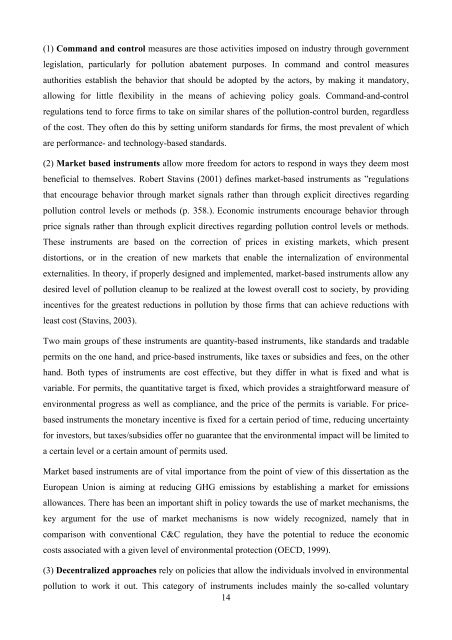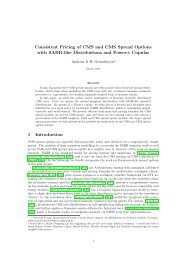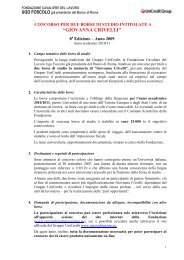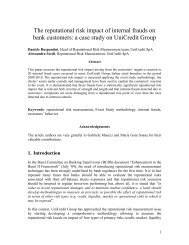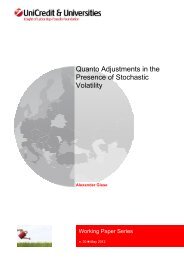Dóra Fazekas Carbon Market Implications for new EU - UniCredit ...
Dóra Fazekas Carbon Market Implications for new EU - UniCredit ...
Dóra Fazekas Carbon Market Implications for new EU - UniCredit ...
Create successful ePaper yourself
Turn your PDF publications into a flip-book with our unique Google optimized e-Paper software.
(1) Command and control measures are those activities imposed on industry through government<br />
legislation, particularly <strong>for</strong> pollution abatement purposes. In command and control measures<br />
authorities establish the behavior that should be adopted by the actors, by making it mandatory,<br />
allowing <strong>for</strong> little flexibility in the means of achieving policy goals. Command-and-control<br />
regulations tend to <strong>for</strong>ce firms to take on similar shares of the pollution-control burden, regardless<br />
of the cost. They often do this by setting uni<strong>for</strong>m standards <strong>for</strong> firms, the most prevalent of which<br />
are per<strong>for</strong>mance- and technology-based standards.<br />
(2) <strong>Market</strong> based instruments allow more freedom <strong>for</strong> actors to respond in ways they deem most<br />
beneficial to themselves. Robert Stavins (2001) defines market-based instruments as ”regulations<br />
that encourage behavior through market signals rather than through explicit directives regarding<br />
pollution control levels or methods (p. 358.). Economic instruments encourage behavior through<br />
price signals rather than through explicit directives regarding pollution control levels or methods.<br />
These instruments are based on the correction of prices in existing markets, which present<br />
distortions, or in the creation of <strong>new</strong> markets that enable the internalization of environmental<br />
externalities. In theory, if properly designed and implemented, market-based instruments allow any<br />
desired level of pollution cleanup to be realized at the lowest overall cost to society, by providing<br />
incentives <strong>for</strong> the greatest reductions in pollution by those firms that can achieve reductions with<br />
least cost (Stavins, 2003).<br />
Two main groups of these instruments are quantity-based instruments, like standards and tradable<br />
permits on the one hand, and price-based instruments, like taxes or subsidies and fees, on the other<br />
hand. Both types of instruments are cost effective, but they differ in what is fixed and what is<br />
variable. For permits, the quantitative target is fixed, which provides a straight<strong>for</strong>ward measure of<br />
environmental progress as well as compliance, and the price of the permits is variable. For price-<br />
based instruments the monetary incentive is fixed <strong>for</strong> a certain period of time, reducing uncertainty<br />
<strong>for</strong> investors, but taxes/subsidies offer no guarantee that the environmental impact will be limited to<br />
a certain level or a certain amount of permits used.<br />
<strong>Market</strong> based instruments are of vital importance from the point of view of this dissertation as the<br />
European Union is aiming at reducing GHG emissions by establishing a market <strong>for</strong> emissions<br />
allowances. There has been an important shift in policy towards the use of market mechanisms, the<br />
key argument <strong>for</strong> the use of market mechanisms is now widely recognized, namely that in<br />
comparison with conventional C&C regulation, they have the potential to reduce the economic<br />
costs associated with a given level of environmental protection (OECD, 1999).<br />
(3) Decentralized approaches rely on policies that allow the individuals involved in environmental<br />
pollution to work it out. This category of instruments includes mainly the so-called voluntary<br />
14


